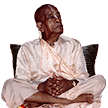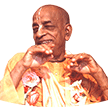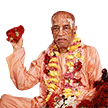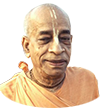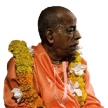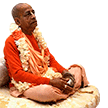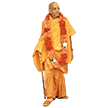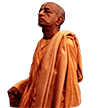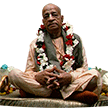Vedanta Philosophy - an essential subject: Difference between revisions
(Created page with "Category:Essential Subjects <!----------------------- edit below this line -----------------------> <!------------------------ begin introduction text below --------------...") |
(Vanibot #0041: Moves Choose Another box to the end) |
||
| Line 2: | Line 2: | ||
<!----------------------- edit below this line -----------------------> | <!----------------------- edit below this line -----------------------> | ||
<!------------------------ begin introduction text below ------------------------> | <!------------------------ begin introduction text below ------------------------> | ||
A Vaiṣṇava should be completely conversant with Vedānta philosophy, yet he should not think that studying Vedānta is all in all and therefore be unattached to the chanting of the holy name. A devotee must know the importance of simultaneously understanding Vedānta philosophy and chanting the holy names. If by studying Vedānta one becomes an impersonalist, he has not been able to understand Vedānta. | |||
Srila Prabhupada's books, lectures, conversations and letters offer a comprehensive presentation of this essential subject as seen in the Vaniquotes '''[[Vaniquotes:Category:Vedanta Philosophy|Vedanta Philosophy]]''' category. An introduction from his books is given below in the following | Srila Prabhupada's books, lectures, conversations and letters offer a comprehensive presentation of this essential subject as seen in the Vaniquotes '''[[Vaniquotes:Category:Vedanta Philosophy|Vedanta Philosophy]]''' category. An introduction from his books is given below in the following 10 quotes. | ||
<!-------- end introduction text and don't touch next three lines ---------> | <!-------- end introduction text and don't touch next three lines ---------> | ||
== Quotes from Srila Prabhupada's books == | == Quotes from Srila Prabhupada's books == | ||
<!----------------- edit quote boxes below this line -----------------> | <!----------------- edit quote boxes below this line -----------------> | ||
{{VaniQuotebox| | {{VaniQuotebox|The Vedanta philosophy mentions that Brahman is the fountainhead of all creation, maintenance and destruction|The Vedānta philosophy mentions that Brahman is the fountainhead of all creation, maintenance and destruction, and Śrīmad-Bhāgavatam, the natural commentation on the Vedānta philosophy, says, janmādy asya yato 'nvayād itarataś cārtheṣv abhijñaḥ svarāṭ. '''(Śrīmad-Bhāgavatam 2.10.45)'''}} | ||
{{VaniQuotebox| | {{VaniQuotebox|A devotee must know the importance of simultaneously understanding Vedanta philosophy and chanting the holy names. If by studying Vedanta one becomes an impersonalist, he has not been able to understand Vedanta|A devotee must know the importance of simultaneously understanding Vedanta philosophy and chanting the holy names. If by studying Vedanta one becomes an impersonalist, he has not been able to understand Vedanta. Cheap Vaiṣṇavas (sahajiyās) do not care to study the Vedānta philosophy as commented upon by the four ācāryas. In the Gauḍīya-sampradāya there is a Vedānta commentary called the Govinda-bhāṣya, but the sahajiyās consider such commentaries to be untouchable philosophical speculation, and they consider the ācāryas to be mixed devotees. Thus they clear their way to hell. '''(Caitanya-caritāmṛta, Ādi-līlā 7.72)'''}} | ||
{{VaniQuotebox| | {{VaniQuotebox|Among sannyasis the cultivation of Vedanta philosophy helps in becoming detached from sense gratification. Thus a sannyasi can protect the prestige of wearing a loincloth|Among sannyāsīs the cultivation of Vedānta philosophy helps in becoming detached from sense gratification. Thus a sannyāsī can protect the prestige of wearing a loincloth (kaupīna). One has to practice sense control as well as mind control and subdue the six forces of speech, mind, anger, tongue, belly and genitals. Then one can become expert in understanding the devotional service of the Lord and thus become a perfect sannyāsī. '''(Caitanya-caritāmṛta, Madhya-līlā 6.75)'''}} | ||
{{VaniQuotebox| | {{VaniQuotebox|As stated in the Bhagavad-gita, whoever hears Vedanta philosophy from Krsna is actually aware of the real meaning of Vedanta. The Mayavadis call themselves Vedantists but do not at all understand the purport of Vedanta philosophy|As stated in the Bhagavad-gītā, whoever hears Vedānta philosophy from Kṛṣṇa is actually aware of the real meaning of Vedānta. The Māyāvādīs call themselves Vedāntists but do not at all understand the purport of Vedānta philosophy. Not being properly educated, people in general think that Vedānta means the Śaṅkarite interpretation. '''(Caitanya-caritāmṛta, Madhya-līlā 17.96)'''}} | ||
{{VaniQuotebox| | {{VaniQuotebox|Mayavadi philosophy is inferior to Buddhist philosophy, which directly denies Vedic authority. Because Mayavada philosophy is disguised as Vedanta philosophy, it is more dangerous than Buddhism or atheism|Although Māyāvādī philosophers pretend to accept the Vedic principles, because they do not accept the Supreme Personality of Godhead they indirectly preach Buddhist philosophy, or atheistic philosophy. Māyāvādī philosophy is inferior to Buddhist philosophy, which directly denies Vedic authority. Because Māyāvāda philosophy is disguised as Vedānta philosophy, it is more dangerous than Buddhism or atheism. '''(Teachings of Lord Caitanya, Chapter 25)'''}} | ||
{{VaniQuotebox| | {{VaniQuotebox|Most Vedic scholars are called Vedantists. These so-called followers of Vedanta philosophy consider the Absolute Truth to be impersonal. They also believe that a person born in a particular caste cannot change his caste until he dies and takes rebirth|Most Vedic scholars are called Vedāntists. These so-called followers of Vedānta philosophy consider the Absolute Truth to be impersonal. They also believe that a person born in a particular caste cannot change his caste until he dies and takes rebirth. '''(Caitanya-caritāmṛta, Madhya-līlā 12.180)'''}} | ||
{{VaniQuotebox| | {{VaniQuotebox|One is enjoying in two. Sri Krsna is the potent factor, and Srimati Radharani is the internal potency. According to Vedanta philosophy, there is no difference between the potent and the potency; they are identical|One is enjoying in two. Śrī Kṛṣṇa is the potent factor, and Śrīmatī Rādhārāṇī is the internal potency. According to Vedānta philosophy, there is no difference between the potent and the potency; they are identical. We cannot differentiate between one and the other, any more than we can separate fire from heat. '''(Caitanya-caritāmṛta, Ādi-līlā 4.56)'''}} | ||
{{VaniQuotebox| | {{VaniQuotebox|One must know very well that Vaisnava philosophers are not sentimentalists or cheap devotees like the sahajiyas. All the Vaisnava acaryas were vastly learned scholars who understood Vedanta philosophy fully|One must know very well that Vaiṣṇava philosophers are not sentimentalists or cheap devotees like the sahajiyās. All the Vaiṣṇava ācāryas were vastly learned scholars who understood Vedānta philosophy fully, for unless one knows Vedānta philosophy he cannot be an ācārya. To be accepted as an ācārya among Indian transcendentalists who follow the Vedic principles, one must become a vastly learned scholar in Vedānta philosophy, either by studying it or hearing it. '''(Caitanya-caritāmṛta, Ādi-līlā 7.102)'''}} | ||
{{VaniQuotebox|Sri Caitanya Mahaprabhu, however, accepted the direct meaning of the Vedanta philosophy and thus defeated the Mayavada philosophy immediately. He opined in this connection that anyone who follows the principles of the Sariraka-bhasya is doomed|Students of Vedic philosophy know very well how strongly Śrī Rāmānujācārya's viśiṣṭādvaita-vāda and Śrī Madhvācārya's tattva-vāda contest the impersonal Māyāvāda philosophy. Śrī Caitanya Mahāprabhu, however, accepted the direct meaning of the Vedānta philosophy and thus defeated the Māyāvāda philosophy immediately. He opined in this connection that anyone who follows the principles of the Śārīraka-bhāṣya is doomed. '''(Caitanya-caritāmṛta, Ādi-līlā 7.110)'''}} | |||
{{VaniQuotebox|The factual propounder of Vedanta philosophy is a Krsna conscious person who always engages in reading and understanding the Bhagavad-gita and Srimad-Bhagavatam and teaching the purport of these books to the entire world|The factual propounder of Vedānta philosophy is a Kṛṣṇa conscious person who always engages in reading and understanding the Bhagavad-gītā and Śrīmad-Bhāgavatam and teaching the purport of these books to the entire world. The Māyāvādīs are very proud of having monopolized the Vedānta philosophy, but devotees have their own commentaries on Vedānta such as Śrīmad-Bhāgavatam and others written by the ācāryas. The commentary of the Gauḍīya Vaiṣṇavas is the Govinda-bhāṣya. '''(Caitanya-caritāmṛta, Ādi-līlā 7.41)'''}} | |||
<!----------------- edit quote boxes above this line -----------------> | <!----------------- edit quote boxes above this line -----------------> | ||
| Line 30: | Line 34: | ||
'''Vedanta Philosophy - [[Vaniquotes:Category:Vedanta Philosophy|explore more within this category]]'''. | '''Vedanta Philosophy - [[Vaniquotes:Category:Vedanta Philosophy|explore more within this category]]'''. | ||
{{EsentialSubjectTotal}} | {{EsentialSubjectTotal}} | ||
<div style="float:left;"> | |||
{{EssentialSubjectnav}} | |||
</div> | |||
__NOTOC__ | __NOTOC__ | ||
__NOEDITSECTION__ | __NOEDITSECTION__ | ||
Latest revision as of 18:06, 22 November 2020
A Vaiṣṇava should be completely conversant with Vedānta philosophy, yet he should not think that studying Vedānta is all in all and therefore be unattached to the chanting of the holy name. A devotee must know the importance of simultaneously understanding Vedānta philosophy and chanting the holy names. If by studying Vedānta one becomes an impersonalist, he has not been able to understand Vedānta.
Srila Prabhupada's books, lectures, conversations and letters offer a comprehensive presentation of this essential subject as seen in the Vaniquotes Vedanta Philosophy category. An introduction from his books is given below in the following 10 quotes.
Quotes from Srila Prabhupada's books
Vedanta Philosophy - explore more within this category.
Vanipedia has now over 903 introductory articles compiled from Srila Prabhupada's books under the series titled Essential Subjects. All these articles can be seen in the Table of Content on the right side of this article and also here in this Umbrella Category. Browse through them to relish the breadth and depth of Srila Prabhupada's teachings - There is a subject for everyone.
